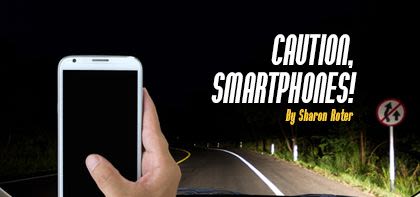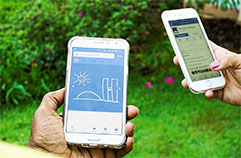
Caution, Smartphones!
While just a few years ago, the average attention span of young children and adolescents was around 15 minutes, today it ranges between eight seconds and three minutes…

Translated by Chana Cohen
In recent years, the media has changed beyond recognition. We all know this and we’ve felt its effect on us personally. The smartphone revolution has turned most of us into very dependent consumers, addicts, and basically slaves!
It’s completely backward – instead of the smartphone serving us, we become slowly but surely slaves to it. In my mind, I see it as thin strands of thread spun around us like a spider web, until we little bugs are stuck and can no longer escape.
In a small experiment I did with some friends, we sat next to the phone and talked about how we wanted to replace a communications provider. Within a short time, each of us received advertisements in our browsers from different providers, offering us their services at cheaper rates. Another time my friend was talking to her husband about a product she was thinking of importing to Israel. The next day the ad for the product was waiting for her on the screen. Have you ever been to a meeting with friends you haven’t seen for a long time and a few hours later you get a suggestion from Facebook to connect with them?
Sounds strange? Maybe. Scary? It definitely scares me. Is it just my imagination? Definitely not!
 Photo credit: By Senado Federal – Fotos produzidas pelo Senado, CC BY 2.0,
Photo credit: By Senado Federal – Fotos produzidas pelo Senado, CC BY 2.0,
A recent article featured studies conducted on thought patterns. It was found that there are two patterns of thinking – the front, which is responsible for quick, intuitive thinking, and the rear, which is responsible for deeper thinking – for imagination, creativity and innovation. The second pattern occurs only during “dead time”, a period free from outside distractions.
These days most of us only have “dead time” in the shower – because that’s the only place we can’t take our smartphones with us! Do you remember those days when we waited on line at the post office and just looked around? On the bus on the way home, we would look at the people around us, the streets and the view. Who even looks up these days? Even when we walk outside, we walk around looking down, at screens.
Studies show that while just a few years ago, the average attention span of young children and adolescents was around 15 minutes, today it ranges between eight seconds and three minutes. Eight seconds! ADD, anyone? Thank the smartphones and smartphone games. No book ever defeated them.
In addition, when brain and heart waves were observed during studying, it was found that when the phone rings or alerts for an incoming message, it creates a spike in heart rate (as the danger of facing a wild animal in the past would cause the heart rate to jump). Adrenaline floods the body every time the heart rate jumps like this and it disrupts the brain waves. This process destroys concentration and impairs our learning.
Who doesn’t recognize that jumpy feeling when you hear the beep of an incoming message? Or the panic when you notice that my phone is not next to me and then, “Oh my gosh, where is my phone, where did I leave it?” How we feel so pressured right then, as if we lost something we really can’t live without…
When teenagers were questioned, they admitted that they’re addicted to their smartphones, and they did so without any hesitation or shame. Usually we say that the very awareness of the problem is already half of the solution, but I think that in this case the awareness doesn’t really help.
Be careful with the permissions you allow the various applications on your smartphone to get all your information. Leave the smartphone far away from you when you do not need it. Give yourself time to just space out (for more than ten seconds) so you don’t lose the ability to be imaginative and creative and to bring new things into the world.
But mostly, protect your children who do not remember a time when there was no smartphone, who do not fully understand the dangers of dependence, and who, without even realizing it, can lose the ability to concentrate in the long term.
* * *
Sharon Roter is a wife, mother, musician and writer. You are invited to contact her at sharonroter@gmail.com










Tell us what you think!
Thank you for your comment!
It will be published after approval by the Editor.